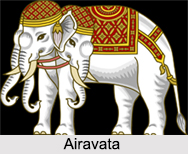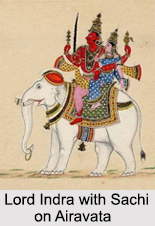 Airavata is the great white elephant with four mighty tusks. He is the king of the elephants and the glorious mount of Lord Indra. He is one of the 16 colossal white celestial elephants from the Hindu mythology of India. Airavata is also called the third son of Kashyapa and Kadru. In Mahabharata he is listed as a great serpent. According to Ramayana, he is the son of Iravati.
Airavata is the great white elephant with four mighty tusks. He is the king of the elephants and the glorious mount of Lord Indra. He is one of the 16 colossal white celestial elephants from the Hindu mythology of India. Airavata is also called the third son of Kashyapa and Kadru. In Mahabharata he is listed as a great serpent. According to Ramayana, he is the son of Iravati.
Etymology of Airavata
The name Airvata comes from the word "iravat" meaning "Child of the Water" and according to Hindu mythology he was created from the blending of the water at the commencement of time. It is also called "Abhra-Matanga", meaning "elephant of the clouds"; "Naga-Malla" meaning "the fighting elephant" and "Arkasodara" meaning "brother of the Sun".
Legends of Airavata
According to the Mantangalila, Airavata took birth when Lord Brahma sang sacred hymns over the halves of the eggshell from which Garuda hatched, followed by seven more male and eight female elephants. Prithu, an Avatar of Vishnu, made Airavata the king of elephants. The eight guardian deities also known as "Asta Dikpalas" preside over the eight points of the compass sitting on an elephant. Indra is the chief among these eight guardian deities.
 As per another Hindu fairy tale, Airavata is believed to have come out of churning the ocean of milk and it is believed that the elephant safeguards one of the points of area. Airavata also stands at the entrance to Swarga, Indra`s palace. The eight protector deities who supervise over the points of the compass each sit on an elephant. Each of these deities has an elephant which takes part in the security and safekeeping of its particular part. Chief among them is Airavata of Indra.
As per another Hindu fairy tale, Airavata is believed to have come out of churning the ocean of milk and it is believed that the elephant safeguards one of the points of area. Airavata also stands at the entrance to Swarga, Indra`s palace. The eight protector deities who supervise over the points of the compass each sit on an elephant. Each of these deities has an elephant which takes part in the security and safekeeping of its particular part. Chief among them is Airavata of Indra.
Once, the great demon king Ravana received great strength from Lord Brahma and was terrorizing all of earth and set his sights on heaven. Indra, the ruler of heaven, desired to put a stop to the assault and confronted Ravana. He fought with all his might against Ravana, but he was a worthy foe. No one had ever been able to harm Ravana, and now it was seen that even Indra himself could not hurt him. Airavata flew through the sky like a swirling hurricane to protect his master. He rushed at Ravana with great force and smashed into him head on. His mighty trunks tore through Ravana"s flesh and caused a great wound. Ravana fell bleeding, nearly dead. Ravana was not defeated and was saved by his son Indrajit, but Airavata gave great hope by showing that Ravana could indeed be wounded. The king of the elephants brought hope to men and Gods on that day.
Airavata in Jainism
In Jain tradition, when a Tirthankara is born, Indra came down with his consort, Sachi, riding their mount, the great elephant Airavata, to celebrate the event.



















